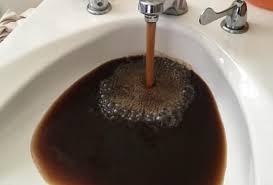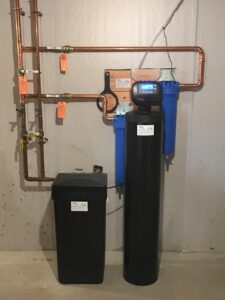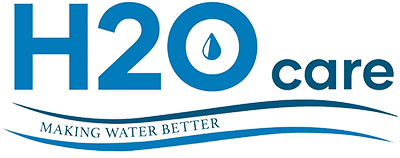
Manganese in Water
Manganese is a mineral that, in very small amounts, is essential for proper functioning of the human body. It is a trace mineral present in the human body in small quantities, primarily in the bones, liver, kidneys and pancreas. Manganese is important in connective tissues, in the formation of bones and blood-clotting factors. It is also involved in fat and carbohydrate metabolism, calcium absorption and blood sugar regulation. In addition, manganese is important for brain and nerve function. However, at higher concentrations, it can cause major staining and pipe corrosion and potential health risks. Evidence of manganese can be seen as brown coloration inside dishwashers or black residue in toilets and shower stalls.

Elevated Manganese
There are two forms of manganese in the environment: Inorganic and organic compounds. Inorganic compounds are used in the production of steel, batteries, ceramics and dietary supplements. These compounds are also generated as combustion products from motor vehicles and coal-burning industrial plants. Organic manganese compounds are used in some pesticides, fertilizers and in a gasoline additive called Methylcyclopentadienyl manganese tricarbonyl (MMT). Finally, manganese compounds can also be present as dust particles in the air and dissolved in groundwater or drinking water

High Efficiency Water Softener
PARTICULATE VS. DISSOLVED MANGANESE
A water softener is effective in removing dissolved forms of manganese, iron and hardness minerals. To remove particulate manganese or iron, a cartridge filter with proper micron rating will be effective. Selecting the appropriate micron rating and style of filter can be determined by a water treatment professional..
Manganese toxicity potential
According to the U.S. Environmental Protection Agency (EPA), the World Health Organization (WHO) and the Agency for Toxic Substances and Disease Registry (ATSDR), manganese at very high levels can pose a neurotoxic risk. Accordingly, exposure to high concentrations has been associated with toxicity to the nervous system, producing a syndrome that resembles Parkinsonism. This type of effect may be more likely to occur in the elderly.
Higher risks for children
Children are considered to be particularly susceptible to possible effects of high levels of manganese exposure. This is because they absorb more and excrete less manganese than adults. Manganese’s effects on the developing nervous system have not been adequately studied. Consequently, it is especially prudent for pregnant women and young children to have drinking water that is below the EPA action level. ATSDR reports several studies that showed decreased ability in neuro-behavioral performance testing and in several educational parameters in children exposed to high level of manganese in drinking water and diet for several years. In following, to access our article published on manganese in Water Technology Magazine, see the link at http://publications/ and then click on the article titled, “Manganese, The Good For You, Bad For You Mineral”.
OTHER AFFECTS OF MANGANESE, IRON, AND HARD WATER
Additionally, some of the affects of these contaminants include corrosion and scaling inside pipes. Also, there may be major staining throughout the home’s showers, bathtubs, and sinks and destruction of hot water heaters way ahead of their useful life. Without water softening, hard water scale can also build-up inside hot water heaters insulating the temperature sensor inside the tank causing them to work much harder to bring the temperature up to the set level. Concurrently, this will reduce the useful life of your hot water heater and require early replacement. For those using their well water for outside lawn irrigation, iron and manganese can cause major staining of outside walkways, house siding and anyplace the water touches. See the link at http://lawn-irrigation/.
H2O Care is a full service water filtration and testing organization, originally formed in 1989, based in Middleton, MA off route 114 with additional offices in Stow & Lakeville, MA. See our published articles in Water Technology Magazines at publications. Reach us at service@h2ocare.com or 978-777-8330.


